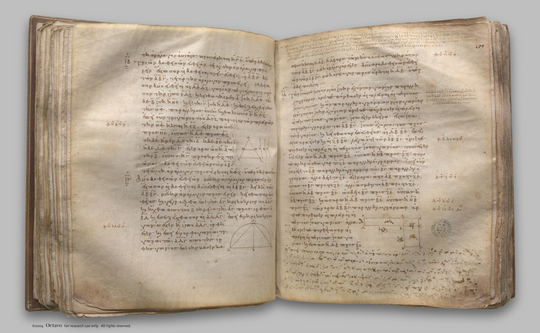index prev next | digilib folio 104

To two given straight lines to find a mean proportional.
| Δύο δοθεισῶν εὐθειῶν μέσην ἀνάλογον προσευρεῖν. Ἔστωσαν αἱ δοθεῖσαι δύο εὐθεῖαι αἱ ΑΒ, ΒΓ: δεῖ δὴ τῶν ΑΒ, ΒΓ μέσην ἀνάλογον προσευρεῖν. Κείσθωσαν ἐπ' εὐθείας, καὶ γεγράφθω ἐπὶ τῆς ΑΓ ἡμικύκλιον τὸ ΑΔΓ, καὶ ἤχθω ἀπὸ τοῦ Β σημείου τῇ ΑΓ εὐθείᾳ πρὸς ὀρθὰς ἡ ΒΔ, καὶ ἐπεζεύχθωσαν αἱ ΑΔ, ΔΓ. Ἐπεὶ ἐν ἡμικυκλίῳ γωνία ἐστὶν ἡ ὑπὸ ΑΔΓ, ὀρθή ἐστιν. καὶ ἐπεὶ ἐν ὀρθογωνίῳ τριγώνῳ τῷ ΑΔΓ ἀπὸ τῆς ὀρθῆς γωνίας ἐπὶ τὴν βάσιν κάθετος ἦκται ἡ ΔΒ, ἡ ΔΒ ἄρα τῶν τῆς βάσεως τμημάτων τῶν ΑΒ, ΒΓ μέση ἀνάλογόν ἐστιν. Δύο ἄρα δοθεισῶν εὐθειῶν τῶν ΑΒ, ΒΓ μέση ἀνάλογον προσεύρηται ἡ ΔΒ: ὅπερ ἔδει ποιῆσαι. | To two given straight lines to find a mean proportional. Let AB, BC be the two given straight lines; thus it is required to find a mean proportional to AB, BC. Let them be placed in a straight line, and let the semicircle ADC be described on AC; let BD be drawn from the point B at right angles to the straight line AC, and let AD, DC be joined. Since the angle ADC is an angle in a semicircle, it is right. [III. 31] And, since, in the right-angled triangle ADC, DB has been drawn from the right angle perpendicular to the base, therefore DB is a mean proportional between the segments of the base, AB, BC. [VI. 8, Por.] |